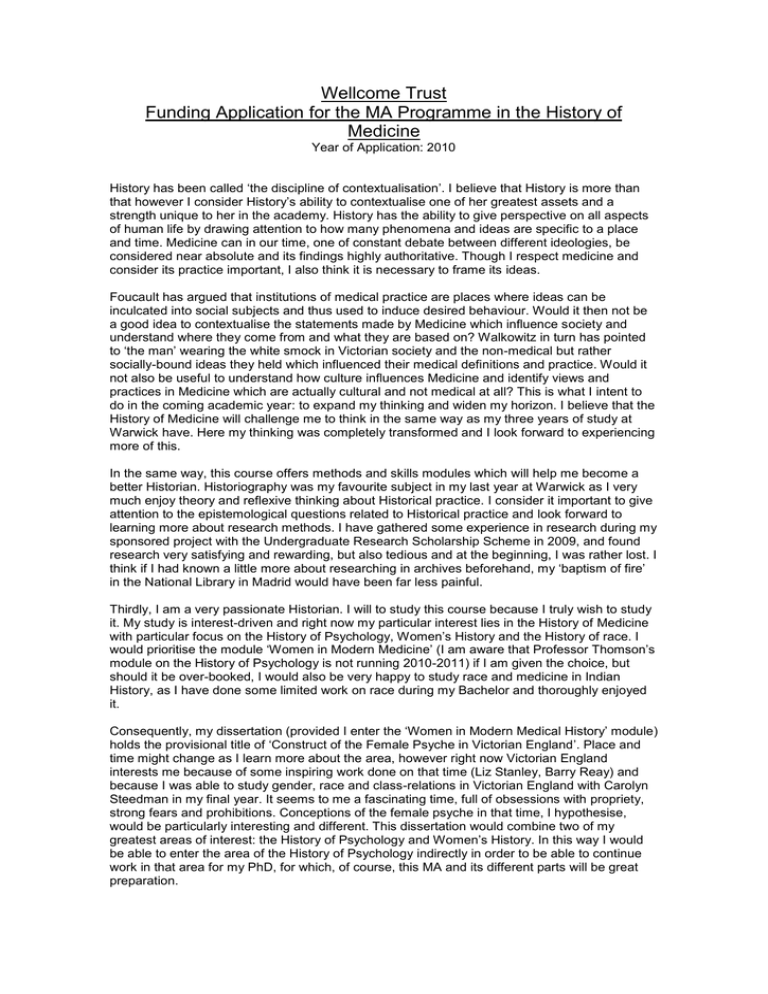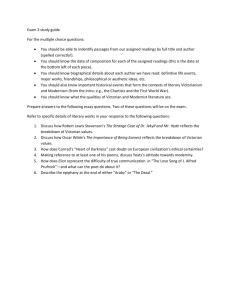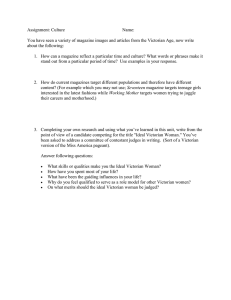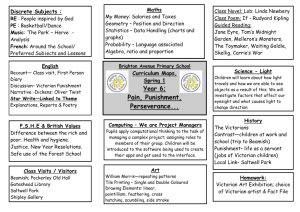Wellcome Trust Medicine
advertisement

Wellcome Trust Funding Application for the MA Programme in the History of Medicine Year of Application: 2010 History has been called ‘the discipline of contextualisation’. I believe that History is more than that however I consider History’s ability to contextualise one of her greatest assets and a strength unique to her in the academy. History has the ability to give perspective on all aspects of human life by drawing attention to how many phenomena and ideas are specific to a place and time. Medicine can in our time, one of constant debate between different ideologies, be considered near absolute and its findings highly authoritative. Though I respect medicine and consider its practice important, I also think it is necessary to frame its ideas. Foucault has argued that institutions of medical practice are places where ideas can be inculcated into social subjects and thus used to induce desired behaviour. Would it then not be a good idea to contextualise the statements made by Medicine which influence society and understand where they come from and what they are based on? Walkowitz in turn has pointed to ‘the man’ wearing the white smock in Victorian society and the non-medical but rather socially-bound ideas they held which influenced their medical definitions and practice. Would it not also be useful to understand how culture influences Medicine and identify views and practices in Medicine which are actually cultural and not medical at all? This is what I intent to do in the coming academic year: to expand my thinking and widen my horizon. I believe that the History of Medicine will challenge me to think in the same way as my three years of study at Warwick have. Here my thinking was completely transformed and I look forward to experiencing more of this. In the same way, this course offers methods and skills modules which will help me become a better Historian. Historiography was my favourite subject in my last year at Warwick as I very much enjoy theory and reflexive thinking about Historical practice. I consider it important to give attention to the epistemological questions related to Historical practice and look forward to learning more about research methods. I have gathered some experience in research during my sponsored project with the Undergraduate Research Scholarship Scheme in 2009, and found research very satisfying and rewarding, but also tedious and at the beginning, I was rather lost. I think if I had known a little more about researching in archives beforehand, my ‘baptism of fire’ in the National Library in Madrid would have been far less painful. Thirdly, I am a very passionate Historian. I will to study this course because I truly wish to study it. My study is interest-driven and right now my particular interest lies in the History of Medicine with particular focus on the History of Psychology, Women’s History and the History of race. I would prioritise the module ‘Women in Modern Medicine’ (I am aware that Professor Thomson’s module on the History of Psychology is not running 2010-2011) if I am given the choice, but should it be over-booked, I would also be very happy to study race and medicine in Indian History, as I have done some limited work on race during my Bachelor and thoroughly enjoyed it. Consequently, my dissertation (provided I enter the ‘Women in Modern Medical History’ module) holds the provisional title of ‘Construct of the Female Psyche in Victorian England’. Place and time might change as I learn more about the area, however right now Victorian England interests me because of some inspiring work done on that time (Liz Stanley, Barry Reay) and because I was able to study gender, race and class-relations in Victorian England with Carolyn Steedman in my final year. It seems to me a fascinating time, full of obsessions with propriety, strong fears and prohibitions. Conceptions of the female psyche in that time, I hypothesise, would be particularly interesting and different. This dissertation would combine two of my greatest areas of interest: the History of Psychology and Women’s History. In this way I would be able to enter the area of the History of Psychology indirectly in order to be able to continue work in that area for my PhD, for which, of course, this MA and its different parts will be great preparation.




